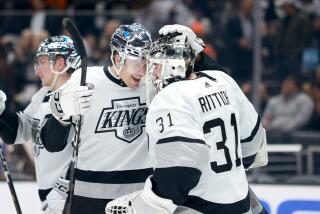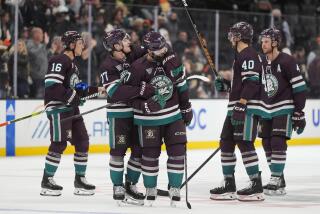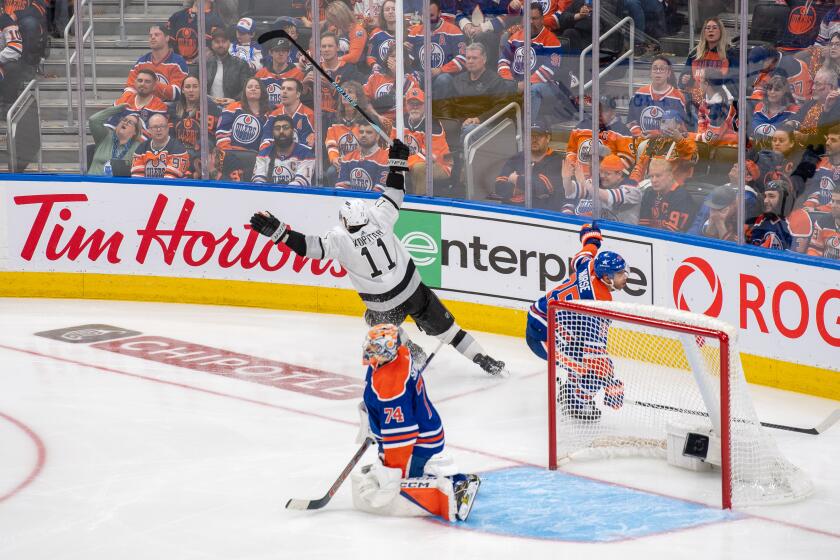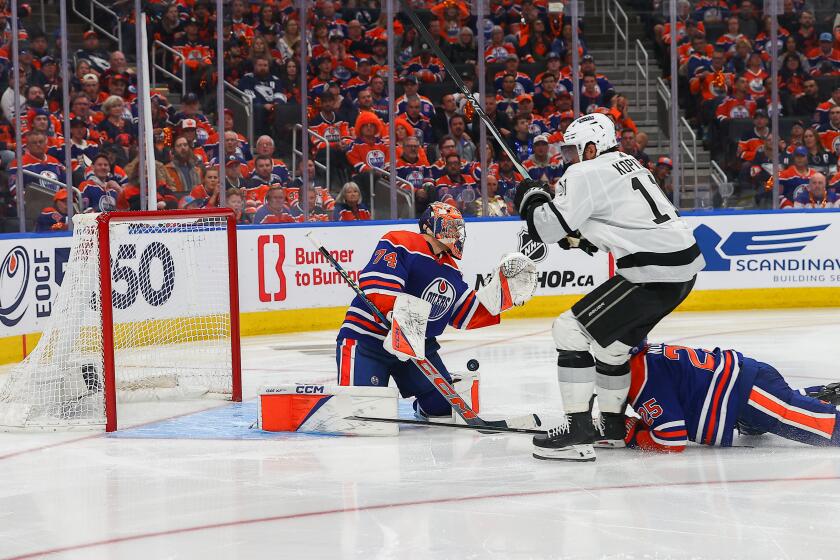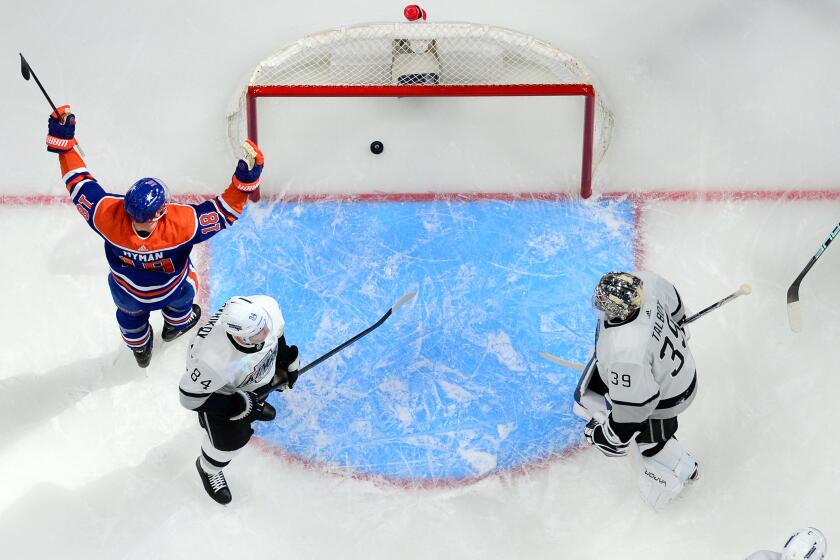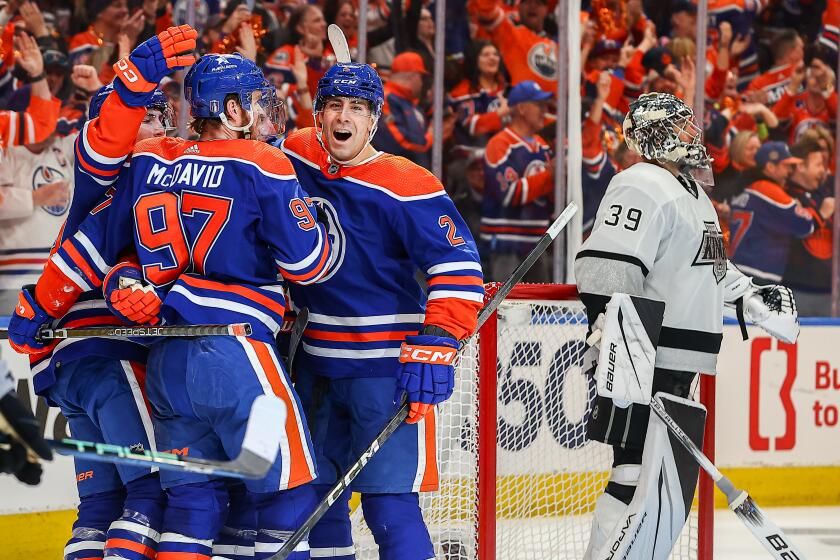Column: Bob Murray’s rehiring of Randy Carlyle as Ducks coach has been validated — just don’t tell him that
Ducks general manager Bob Murray put his reputation on the line last June when he rehired the coach he had fired 4 1/2 years earlier, Randy Carlyle, relying on instinct when he couldn’t be sure this seemingly preposterous move would succeed.
Murray’s years of tinkering at the trade deadline in search of a spark plug or role player hadn’t gotten the Ducks as far as he believed they should go, and player-friendly Bruce Boudreau — a sharp coaching contrast to the hard-driving Carlyle — had failed in four tries to get a talented team past its Game 7 playoff yips. It was make-or-break time for the Ducks’ older core players and it was a make-or-break decision for Murray, too.
His hiring of Carlyle was mocked. Ridiculed. It was criticized as harshly as Murray’s decision to give a two-year, $8-million contract extension with a no-move clause to Kevin Bieksa when the veteran defenseman was clearly on the downside of his career, questioned as critically as the six-year, $41.25-million contract Murray gave to center Ryan Kesler, a deal that kicked in after Kesler had turned 32.
But Murray heard Carlyle speak of shedding his old-school ways and gaining a new perspective after working with young players while he coached the Toronto Maple Leafs. Carlyle said he’d be tough but flexible and let youth have its say, appealing to a team whose scouting and development departments have uncovered and polished so many gems despite usually picking late in drafts.
Murray and Dave Nonis, who was advising him in the interview process, knew Carlyle was a good bench strategist and capable of handling a veteran team, as when Carlyle guided a mature Ducks team to the Stanley Cup in 2007. Murray had to take it on faith that Carlyle had adapted to the modern game and would meet young players’ expectations they’d be given explanations and not just orders. Murray pretty much bet his job on it.
“You never know,” Murray said of his level of certainty that Carlyle had truly embraced change. “We really felt that his time in Toronto was really good for him. We benefited from it. … I think we’ve all had to make that learning transition, myself included, to younger players, because the team that won the Cup was an older team, no doubt about it, and that was very good for him and for us, handling all that.”
Murray could easily have said he felt vindicated for hiring Carlyle after the Ducks finally got past their Game 7 playoff hex on Wednesday by grinding out a 2-1 victory over the Edmonton Oilers, which put them in the Western Conference finals against the Nashville Predators, but he rejected that story line. He scoffed at the word “validation” too, and deflected credit to players who have taken their cues from Carlyle and have learned to smoothly navigate past even the most ominous-looking bumps in the road, including an own goal that put them in an early hole Wednesday.
“I look at it, we try to win. You do what you have to do to try to win. You do what you have to do at different times,” Murray said. “I think what you have to understand is the group of people in that dressing room, the way that game started [Wednesday] night. Everybody is saying, ‘Oh, here we go again.’ They didn’t miss a beat.”
He had called out his core players after last season, and they responded. “Sometimes you just, you want more, and you know there’s more there from people, and I think they’ve realized it,” Murray said. “Again, it starts with the leadership group, who were outstanding, obviously.”
Because such leaders as Kesler, Bieksa, Ryan Getzlaf and Corey Perry are into their 30s, the Ducks are seen as an old team. But as Murray pointed out, their defense is young. The six defensemen who played in Game 7 (which Bieksa missed) averaged 23.6 years old and all six were drafted and developed by the Ducks. In addition, 21-year-old left wing Nick Ritchie, a 2014 first-round pick, scored the series-clinching goal. Forward Rickard Rakell, who was picked 30th by the Ducks in 2011 and just turned 24, scored 33 goals and 51 points during the season — both career-highs — and has six goals and 10 points in the playoffs.
Murray’s small-scale trades the past few seasons haven’t had much impact — the Carl Hagelin era was oddly brief — and the conditional draft pick he gave Dallas to acquire right wing Patrick Eaves in February became a first-round selection when the Ducks reached the conference finals. Eaves, a pending unrestricted free agent, was playing well until he hurt his foot in Game 3 against Edmonton. That’s simply misfortune, and Murray said he has no regrets about the trade.
“I think Patrick has a huge effect on the organization,” he said. “It was a move, I thought, that was very good for the team.”
It might turn out that Murray’s best move was his riskiest: rehiring Carlyle. The Ducks are only halfway to where they want to go but Murray and Carlyle have pointed them in the right direction.
Follow Helene Elliott on Twitter @helenenothelen
More to Read
Go beyond the scoreboard
Get the latest on L.A.'s teams in the daily Sports Report newsletter.
You may occasionally receive promotional content from the Los Angeles Times.
